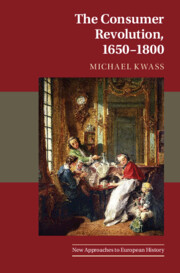Book contents
- The Consumer Revolution, 1650–1800
- New Approaches to European History
- The Consumer Revolution, 1650–1800
- Copyright page
- Dedication
- Contents
- Illustrations
- Acknowledgments
- Abbreviations
- Introduction
- 1 Consumer Revolution
- 2 The Globalization of European Consumption
- 3 Going Shopping
- 4 The Cultural Meanings of Consumption
- 5 Consuming Enlightenment
- 6 The Luxury Debate
- 7 The Politics of Consumption in the Age of Revolution
- Conclusion
- Select Bibliography
- Index
Conclusion
Published online by Cambridge University Press: 13 January 2022
- The Consumer Revolution, 1650–1800
- New Approaches to European History
- The Consumer Revolution, 1650–1800
- Copyright page
- Dedication
- Contents
- Illustrations
- Acknowledgments
- Abbreviations
- Introduction
- 1 Consumer Revolution
- 2 The Globalization of European Consumption
- 3 Going Shopping
- 4 The Cultural Meanings of Consumption
- 5 Consuming Enlightenment
- 6 The Luxury Debate
- 7 The Politics of Consumption in the Age of Revolution
- Conclusion
- Select Bibliography
- Index
Summary
The contemporary world seems obsessed with stuff: how to get it, what to do with it, how to get rid of it. Although historians long assumed that rising consumption began with industrialization, we now know that the pace of consumption accelerated in the early modern world well before the age of mass production. In seventeenth- and eighteenth-century Europe, women and men began to accumulate more clothing, carry more personal accessories, fill their households with more furnishings, and wear, smoke, snort, eat, and drink prodigious quantities of colonial products. Although scholars debate whether to call this growth in consumption “revolutionary” or “evolutionary,” they agree that is was transformational. It changed how people looked, ate, socialized, and thought, giving rise to debates about moral progress and ushering in new forms of revolutionary political activism. This book has offered a new interpretation of the consumer revolution by incorporating questions of empire, political economy, global trade, slavery, material culture, philosophy, politics, and revolution. One important theme that remains to be explored, however, is the relationship between consumption and the environment. Any solution to the climate crisis will require a revolution in how humans think about – and practice – consumption. Although today nothing seems more natural than relentless consumption, it, too, has a history. Heightening awareness of the fact that consumption in the contemporary world is a historical construct, an outcome of contingent historical factors, is an important first step toward resolving the climate crisis. For any invention of human society can be reinvented.
Keywords
- Type
- Chapter
- Information
- The Consumer Revolution, 1650–1800 , pp. 211 - 224Publisher: Cambridge University PressPrint publication year: 2022

